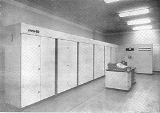
List of computer systems from SFRY
Encyclopedia
This is the list of computer systems from SFRY. It lists all computers that were significantly or completely designed in Socialist Federal Republic of Yugoslavia
before the breakup of the country in 1990s. This list does not include imported foreign
computers. Some of those were assembled as per original manufacturer's license. See History of computer hardware in the SFRY
for more information.
Socialist Federal Republic of Yugoslavia
The Socialist Federal Republic of Yugoslavia was the Yugoslav state that existed from the abolition of the Yugoslav monarchy until it was dissolved in 1992 amid the Yugoslav Wars. It was a socialist state and a federation made up of six socialist republics: Bosnia and Herzegovina, Croatia,...
before the breakup of the country in 1990s. This list does not include imported foreign
Western world
The Western world, also known as the West and the Occident , is a term referring to the countries of Western Europe , the countries of the Americas, as well all countries of Northern and Central Europe, Australia and New Zealand...
computers. Some of those were assembled as per original manufacturer's license. See History of computer hardware in the SFRY
History of computer hardware in the SFRY
The Socialist Federal Republic of Yugoslavia was a socialist country that existed in the second half of the 20th century. Being communist meant that strict technology import rules and regulations shaped the development of computer history in the country, unlike in the Western world. However, since...
for more information.
| Picture | Type | Model | Manufacturer | Origin | Year | Notes |
|---|---|---|---|---|---|---|
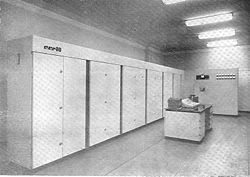 | Early | CER-10 CER-10 CER model 10 was a vacuum tube , transistor and relays based computer developed at IBK-Vinca and Mihajlo Pupin Institute in 1960 ref.,]. This was the first digital computer ever developed in SFRY.... | Mihajlo Pupin Mihajlo Pupin Institute Mihajlo Pupin Institute is an institute based in Belgrade, Serbia notable for manufacturing numerous computer systems used in Socialist Federal Republic of Yugoslavia - especially early CER and later TIM line of computers. It is named after Mihajlo Idvorski Pupin.The Institute is well known in... | Serbia Serbia Serbia , officially the Republic of Serbia , is a landlocked country located at the crossroads of Central and Southeast Europe, covering the southern part of the Carpathian basin and the central part of the Balkans... /List | 1960 | First computer designed and produced in SFRY |
| Early | CER-2 CER-2 CER model 22 was an early digital computer developed by Mihajlo Pupin Institute in 1960s.-See also:* CER Computers* Mihajlo Pupin Institute... | Mihajlo Pupin Mihajlo Pupin Institute Mihajlo Pupin Institute is an institute based in Belgrade, Serbia notable for manufacturing numerous computer systems used in Socialist Federal Republic of Yugoslavia - especially early CER and later TIM line of computers. It is named after Mihajlo Idvorski Pupin.The Institute is well known in... | Serbia Serbia Serbia , officially the Republic of Serbia , is a landlocked country located at the crossroads of Central and Southeast Europe, covering the southern part of the Carpathian basin and the central part of the Balkans... /List | ~1960s | ||
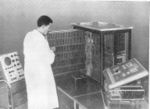 | Early | CER-20 CER-20 CER model 20 was an early digital computer developed by Mihajlo Pupin Institute . It was designed as the "electronic bookkeeping machine". First prototype was planned for 1964.-See also:* CER Computers* Mihajlo Pupin Institute* History of computer hardware in the SFRY... | Mihajlo Pupin Mihajlo Pupin Institute Mihajlo Pupin Institute is an institute based in Belgrade, Serbia notable for manufacturing numerous computer systems used in Socialist Federal Republic of Yugoslavia - especially early CER and later TIM line of computers. It is named after Mihajlo Idvorski Pupin.The Institute is well known in... | Serbia Serbia Serbia , officially the Republic of Serbia , is a landlocked country located at the crossroads of Central and Southeast Europe, covering the southern part of the Carpathian basin and the central part of the Balkans... /List | 1964 | "electronic bookkeeping machine" |
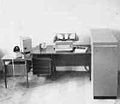 | Early | CER-200 CER-200 CER model 200 was an early digital computer developed by Mihajlo Pupin Institute in 1966.-See also:* CER Computers* Mihajlo Pupin Institute* History of computer hardware in the SFRY... | Mihajlo Pupin Mihajlo Pupin Institute Mihajlo Pupin Institute is an institute based in Belgrade, Serbia notable for manufacturing numerous computer systems used in Socialist Federal Republic of Yugoslavia - especially early CER and later TIM line of computers. It is named after Mihajlo Idvorski Pupin.The Institute is well known in... | Serbia Serbia Serbia , officially the Republic of Serbia , is a landlocked country located at the crossroads of Central and Southeast Europe, covering the southern part of the Carpathian basin and the central part of the Balkans... /List | 1966 | |
| Early | CER-202 CER-202 CER model 202 was an early digital computer developed by Mihajlo Pupin Institute in the 1960s.-See also:* CER Computers* Mihajlo Pupin Institute... | Mihajlo Pupin Mihajlo Pupin Institute Mihajlo Pupin Institute is an institute based in Belgrade, Serbia notable for manufacturing numerous computer systems used in Socialist Federal Republic of Yugoslavia - especially early CER and later TIM line of computers. It is named after Mihajlo Idvorski Pupin.The Institute is well known in... | Serbia Serbia Serbia , officially the Republic of Serbia , is a landlocked country located at the crossroads of Central and Southeast Europe, covering the southern part of the Carpathian basin and the central part of the Balkans... /List | ~1960s | ||
| Early | CER-22 CER-22 CER model 22 was a transistor based computer developed by Mihajlo Pupin Institute in 1967. It was originally intended for banking applications and was used for data processing and management planning in banks, trade and utility companies in Belgrade.Three CER-22 computers were purchased by... | Mihajlo Pupin Mihajlo Pupin Institute Mihajlo Pupin Institute is an institute based in Belgrade, Serbia notable for manufacturing numerous computer systems used in Socialist Federal Republic of Yugoslavia - especially early CER and later TIM line of computers. It is named after Mihajlo Idvorski Pupin.The Institute is well known in... | Serbia Serbia Serbia , officially the Republic of Serbia , is a landlocked country located at the crossroads of Central and Southeast Europe, covering the southern part of the Carpathian basin and the central part of the Balkans... /List | 1967 | intended for banking applications | |
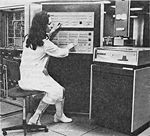 | Early | CER-12 CER-12 CER model 12 was an third generation digital computer developed by Mihajlo Pupin Institute in 1971 and intended for "business and statistical data processing". However, manufacturer also stated, at the time, that having in mind its architecture and performance, it can also be used successfully in... | Mihajlo Pupin Mihajlo Pupin Institute Mihajlo Pupin Institute is an institute based in Belgrade, Serbia notable for manufacturing numerous computer systems used in Socialist Federal Republic of Yugoslavia - especially early CER and later TIM line of computers. It is named after Mihajlo Idvorski Pupin.The Institute is well known in... | Serbia Serbia Serbia , officially the Republic of Serbia , is a landlocked country located at the crossroads of Central and Southeast Europe, covering the southern part of the Carpathian basin and the central part of the Balkans... /List | 1971 | "electronic computer for business data processing" |
 | Early | CER-203 CER-203 CER model 203 was an early digital computer developed by Mihajlo Pupin Institute in 1971. It was designed to process data of medium sized businesses:... | Mihajlo Pupin Mihajlo Pupin Institute Mihajlo Pupin Institute is an institute based in Belgrade, Serbia notable for manufacturing numerous computer systems used in Socialist Federal Republic of Yugoslavia - especially early CER and later TIM line of computers. It is named after Mihajlo Idvorski Pupin.The Institute is well known in... | Serbia Serbia Serbia , officially the Republic of Serbia , is a landlocked country located at the crossroads of Central and Southeast Europe, covering the southern part of the Carpathian basin and the central part of the Balkans... /List | 1971 | "electronic computer for business applications" |
 | Hybrid Hybrid computer Hybrid computers are computers that exhibit features of analog computers and digital computers. The digital component normally serves as the controller and provides logical operations, while the analog component normally serves as a solver of differential equations.In general, analog computers are... | HRS-100 HRS-100 HRS-100, ХРС-100, GVS-100 or ГВС-100, was a third generation hybrid computer developed by Mihajlo Pupin Institute and engineers from USSR in the period from 1968. to 1971. Three systems HRS-100 were deployed in Academy of Sciences of USSR in Moscow and Novosibirsk in 1971. and 1978... | Mihajlo Pupin Mihajlo Pupin Institute Mihajlo Pupin Institute is an institute based in Belgrade, Serbia notable for manufacturing numerous computer systems used in Socialist Federal Republic of Yugoslavia - especially early CER and later TIM line of computers. It is named after Mihajlo Idvorski Pupin.The Institute is well known in... | Serbia Serbia Serbia , officially the Republic of Serbia , is a landlocked country located at the crossroads of Central and Southeast Europe, covering the southern part of the Carpathian basin and the central part of the Balkans... /List | 1971 | intended for scientific and technical research, modelling of complex dynamical system Dynamical system A dynamical system is a concept in mathematics where a fixed rule describes the time dependence of a point in a geometrical space. Examples include the mathematical models that describe the swinging of a clock pendulum, the flow of water in a pipe, and the number of fish each springtime in a... s in real and accelerated time |
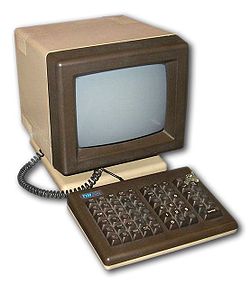 | TIM-100 TIM-100 -Technical description of the TIM-100:TIM-100 was a PTT teller microcomputer developed by Mihajlo Pupin Institute in 1985.It was based on the Intel microprocessors types 80x86 and VLSI circuitry... | Mihajlo Pupin Mihajlo Pupin Institute Mihajlo Pupin Institute is an institute based in Belgrade, Serbia notable for manufacturing numerous computer systems used in Socialist Federal Republic of Yugoslavia - especially early CER and later TIM line of computers. It is named after Mihajlo Idvorski Pupin.The Institute is well known in... | Serbia Serbia Serbia , officially the Republic of Serbia , is a landlocked country located at the crossroads of Central and Southeast Europe, covering the southern part of the Carpathian basin and the central part of the Balkans... /List | 1985 | Post office computer | |
 | TIM-001 TIM-001 TIM-001 was an application development microcomputer developed by Mihajlo Pupin Institute in 1983/84.-Literature::1. Dragoljub Milićević,Dušan Hristović : Računari TIM, Naučna knjiga, Belgrade 1990. In Serbian language.... | Mihajlo Pupin Mihajlo Pupin Institute Mihajlo Pupin Institute is an institute based in Belgrade, Serbia notable for manufacturing numerous computer systems used in Socialist Federal Republic of Yugoslavia - especially early CER and later TIM line of computers. It is named after Mihajlo Idvorski Pupin.The Institute is well known in... | Serbia Serbia Serbia , officially the Republic of Serbia , is a landlocked country located at the crossroads of Central and Southeast Europe, covering the southern part of the Carpathian basin and the central part of the Balkans... /List | 1985 | Development computer used in post offices | |
| TIM-600 | Mihajlo Pupin Mihajlo Pupin Institute Mihajlo Pupin Institute is an institute based in Belgrade, Serbia notable for manufacturing numerous computer systems used in Socialist Federal Republic of Yugoslavia - especially early CER and later TIM line of computers. It is named after Mihajlo Idvorski Pupin.The Institute is well known in... | Serbia Serbia Serbia , officially the Republic of Serbia , is a landlocked country located at the crossroads of Central and Southeast Europe, covering the southern part of the Carpathian basin and the central part of the Balkans... /List | ||||
| School | TIM-011 TIM-011 TIM 011 was an educational or Personal computer for school microcomputer developed by Mihajlo Pupin Institute of Serbia in 1987. There were about 1.200 TIM-011 computers in Serbian schools in the 1990's.-Specifications:... | Mihajlo Pupin Mihajlo Pupin Institute Mihajlo Pupin Institute is an institute based in Belgrade, Serbia notable for manufacturing numerous computer systems used in Socialist Federal Republic of Yugoslavia - especially early CER and later TIM line of computers. It is named after Mihajlo Idvorski Pupin.The Institute is well known in... | Serbia Serbia Serbia , officially the Republic of Serbia , is a landlocked country located at the crossroads of Central and Southeast Europe, covering the southern part of the Carpathian basin and the central part of the Balkans... /List | ~1987 | HD64180 HD64180 The HD64180 is a Z80-based embedded microprocessor developed by Hitachi with an integrated memory management unit . The Hitachi HD64180 "Super Z80" was later licensed to Zilog and sold by them as the Z64180 and with some enhancements as the Zilog Z180. It has the following features:* Memory... -based computer with integrated green monochrome monitor, running CP/M CP/M CP/M was a mass-market operating system created for Intel 8080/85 based microcomputers by Gary Kildall of Digital Research, Inc... with ZCPR3 | |
| TIM-40M | Mihajlo Pupin Mihajlo Pupin Institute Mihajlo Pupin Institute is an institute based in Belgrade, Serbia notable for manufacturing numerous computer systems used in Socialist Federal Republic of Yugoslavia - especially early CER and later TIM line of computers. It is named after Mihajlo Idvorski Pupin.The Institute is well known in... | Serbia Serbia Serbia , officially the Republic of Serbia , is a landlocked country located at the crossroads of Central and Southeast Europe, covering the southern part of the Carpathian basin and the central part of the Balkans... /List | ||||
| ATLAS‑TIM AT 32 ATLAS-TIM AT 32 The ATLAS-TIM AT 32 was the process computer developed by Mihajlo Pupin Institute in Belgrade in the 1980s. The designers were Dr Vukasin Masnikosa, Dr Bozidar Levi, Mr Milenko Nikolic and their associates... | Mihajlo Pupin Mihajlo Pupin Institute Mihajlo Pupin Institute is an institute based in Belgrade, Serbia notable for manufacturing numerous computer systems used in Socialist Federal Republic of Yugoslavia - especially early CER and later TIM line of computers. It is named after Mihajlo Idvorski Pupin.The Institute is well known in... | Serbia Serbia Serbia , officially the Republic of Serbia , is a landlocked country located at the crossroads of Central and Southeast Europe, covering the southern part of the Carpathian basin and the central part of the Balkans... /List | ||||
| Home/School | Galaksija Galaksija The Galaksija was originally a build-it-yourself computer designed by Voja Antonić. It was featured in the special edition Računari u vašoj kući of a popular eponymous science magazine, published late December 1983 in Belgrade, Yugoslavia... | Elektronika Inženjering | Serbia Serbia Serbia , officially the Republic of Serbia , is a landlocked country located at the crossroads of Central and Southeast Europe, covering the southern part of the Carpathian basin and the central part of the Balkans... /List | 1983 | Extremely popular build-it-yourself computer designed by Voja Antonić Voja Antonic Voja Antonić is a Serbian inventor, journalist and writer. He was also a magazine editor and contributed to a number of radio shows but he is best known for creating a build-it-yourself home computer Galaksija and originating a related "Build your own computer Galaksija" initiative with Dejan... | |
| Home/School | Galaksija Plus Galaksija Plus Galaksija Plus was an improved version of Galaksija, with 256x208 monochrome graphics mode, 3-voice sound based on AY-3-8910 and 48 KiB RAM.The hardware of Galaksija Plus was created by Nenad Dunjić and software by Milan Tadić in 1985... | - | Serbia Serbia Serbia , officially the Republic of Serbia , is a landlocked country located at the crossroads of Central and Southeast Europe, covering the southern part of the Carpathian basin and the central part of the Balkans... /List | ~1985 | Enhanced version of Galaksija Galaksija The Galaksija was originally a build-it-yourself computer designed by Voja Antonić. It was featured in the special edition Računari u vašoj kući of a popular eponymous science magazine, published late December 1983 in Belgrade, Yugoslavia... | |
| School/Home | Pecom 32 Pecom 32 Pecom 32 was an educational and/or home computer developed by Elektronska Industrija Niš of Serbia in 1985.-Specifications:* CPU: CPD 1802B 5V7 running at 5 MHz* ROM: 16 KB, with optional 16 KB upgrade containing enhanced editor and assembler... | Ei Niš | Serbia Serbia Serbia , officially the Republic of Serbia , is a landlocked country located at the crossroads of Central and Southeast Europe, covering the southern part of the Carpathian basin and the central part of the Balkans... /List | 1985 | ||
| School/Home | Pecom 64 Pecom 64 Pecom 64 was an educational and/or home computer developed by Elektronska Industrija Niš of Serbia in 1985.- Specifications :* CPU: CDP 1802B 5V7 running at 2.813 MHz* ROM: 16 KB, with optional 16 KB upgrade containing enhanced editor and assembler... | Ei Niš | Serbia Serbia Serbia , officially the Republic of Serbia , is a landlocked country located at the crossroads of Central and Southeast Europe, covering the southern part of the Carpathian basin and the central part of the Balkans... /List | 1985 | ||
| PC IBM PC compatible IBM PC compatible computers are those generally similar to the original IBM PC, XT, and AT. Such computers used to be referred to as PC clones, or IBM clones since they almost exactly duplicated all the significant features of the PC architecture, facilitated by various manufacturers' ability to... | Lira | Ei Niš | Serbia Serbia Serbia , officially the Republic of Serbia , is a landlocked country located at the crossroads of Central and Southeast Europe, covering the southern part of the Carpathian basin and the central part of the Balkans... /List | IBM PC XT compatible computer in Home computer Home computer Home computers were a class of microcomputers entering the market in 1977, and becoming increasingly common during the 1980s. They were marketed to consumers as affordable and accessible computers that, for the first time, were intended for the use of a single nontechnical user... form (mainboard is under the keyboard) | ||
| PC IBM PC compatible IBM PC compatible computers are those generally similar to the original IBM PC, XT, and AT. Such computers used to be referred to as PC clones, or IBM clones since they almost exactly duplicated all the significant features of the PC architecture, facilitated by various manufacturers' ability to... | ET-188A | Novkabel Novi Sad | Serbia Serbia Serbia , officially the Republic of Serbia , is a landlocked country located at the crossroads of Central and Southeast Europe, covering the southern part of the Carpathian basin and the central part of the Balkans... /List | IBM PC XT compatible computer | ||
| School/Home | Misedo 85 | Montex Ivangrad (Berane Berane Berane , formerly Ivangrad, is a town in north-eastern Montenegro. It has a population of 11,776 .Berane is the centre of municipality and one of the centres of Polimlje area, named after the Lim River, on which Berane is situated.-History:During the medieval period the Montenegrin land of Berane... ) | Montenegro Montenegro Montenegro Montenegrin: Crna Gora Црна Гора , meaning "Black Mountain") is a country located in Southeastern Europe. It has a coast on the Adriatic Sea to the south-west and is bordered by Croatia to the west, Bosnia and Herzegovina to the northwest, Serbia to the northeast and Albania to the... | 1985 | The clone of Tandy Tandy Tandy is the title of a short story by Sherwood Anderson.Tandy is also a name which can refer to:-Tandy Corporation:* Tandy Corporation - a leather supply company which subsequently became the RadioShack Corporation... 's TRS-80 TRS-80 TRS-80 was Tandy Corporation's desktop microcomputer model line, sold through Tandy's Radio Shack stores in the late 1970s and early 1980s. The first units, ordered unseen, were delivered in November 1977, and rolled out to the stores the third week of December. The line won popularity with... | |
| PLC Programmable logic controller A programmable logic controller or programmable controller is a digital computer used for automation of electromechanical processes, such as control of machinery on factory assembly lines, amusement rides, or light fixtures. PLCs are used in many industries and machines... | PA512 PA512 PA512 was an industrial programmable logic controller - a portable, computer developed by Ivo Lola Ribar Institute of Serbia in 1980. Six years later, an enhacement product was made, LPA512.... | Ivo Lola Ribar Ivo Lola Ribar Institute Ivo Lola Ribar Institute is a Belgrade, Serbia-based manufacturer of heavy machine tools, industrial equipment and industrial computers. It has been named after Croatian People's Hero of Yugoslavia Ivo Lola Ribar, the youngest son of Ivan Ribar.-See also:... | Serbia Serbia Serbia , officially the Republic of Serbia , is a landlocked country located at the crossroads of Central and Southeast Europe, covering the southern part of the Carpathian basin and the central part of the Balkans... /List | 1980 | ||
 | School | Lola 8 Lola 8 Lola 8 was a computer developed by Ivo Lola Ribar Institute of SR Serbia in 1982 and announced for release in 1985. As the manufacturer's focus was CNC equipment, Lola 8 was built out of components they used for CNC machines.... | Ivo Lola Ribar Ivo Lola Ribar Institute Ivo Lola Ribar Institute is a Belgrade, Serbia-based manufacturer of heavy machine tools, industrial equipment and industrial computers. It has been named after Croatian People's Hero of Yugoslavia Ivo Lola Ribar, the youngest son of Ivan Ribar.-See also:... | Serbia Serbia Serbia , officially the Republic of Serbia , is a landlocked country located at the crossroads of Central and Southeast Europe, covering the southern part of the Carpathian basin and the central part of the Balkans... /List | ~1982 | |
| PLC Programmable logic controller A programmable logic controller or programmable controller is a digital computer used for automation of electromechanical processes, such as control of machinery on factory assembly lines, amusement rides, or light fixtures. PLCs are used in many industries and machines... | LPA512 LPA512 LPA512 was an industrial programmable logic controller - a small , portable, computer developed by Ivo Lola Ribar Institute of Serbia in 1986 as an enhacement to its prior product, PA512. It was first deployed in Maribor car factory.... | Ivo Lola Ribar Ivo Lola Ribar Institute Ivo Lola Ribar Institute is a Belgrade, Serbia-based manufacturer of heavy machine tools, industrial equipment and industrial computers. It has been named after Croatian People's Hero of Yugoslavia Ivo Lola Ribar, the youngest son of Ivan Ribar.-See also:... | Serbia Serbia Serbia , officially the Republic of Serbia , is a landlocked country located at the crossroads of Central and Southeast Europe, covering the southern part of the Carpathian basin and the central part of the Balkans... /List | 1986 | ||
| (none) | theoretical | NAR 1 NAR 1 NAR 1 or just NAR was a theoretical model of a computer created by Faculty of Mathematics of University of Belgrade professor Nedeljko Parezanović... | (none) | Serbia Serbia Serbia , officially the Republic of Serbia , is a landlocked country located at the crossroads of Central and Southeast Europe, covering the southern part of the Carpathian basin and the central part of the Balkans... /List | ? | Created by Nedeljko Parezanović |
| (none) | theoretical | NAR 2 NAR 2 NAR 2 was a theoretical model of a 32-bit word computer created by Faculty of Mathematics of University of Belgrade professor Nedeljko Parezanović as an enhacement to its predecessor, NAR 1. It was used for Assembly language and Computer architecture courses. The word "nar" means Pomegranate in... | (none) | Serbia Serbia Serbia , officially the Republic of Serbia , is a landlocked country located at the crossroads of Central and Southeast Europe, covering the southern part of the Carpathian basin and the central part of the Balkans... /List | ? | Created by Nedeljko Parezanović |
.jpg) | School | Galeb Galeb (computer) Galeb was an 8-bit computer developed by the PEL Varaždin company in Yugoslavia in the early 1980s. A grand total of 250 were produced by the end of the summer of 1984, before being replaced by Orao.... | PEL Varaždin | Croatia Croatia Croatia , officially the Republic of Croatia , is a unitary democratic parliamentary republic in Europe at the crossroads of the Mitteleuropa, the Balkans, and the Mediterranean. Its capital and largest city is Zagreb. The country is divided into 20 counties and the city of Zagreb. Croatia covers ... /List | 1984 | |
.jpg) | School | Orao Orao (computer) Orao was an 8-bit computer developed by PEL Varaždin in 1984. It was used as a standard primary school computer in Croatia and Vojvodina from 1985 to 1991.... | PEL Varaždin | Croatia Croatia Croatia , officially the Republic of Croatia , is a unitary democratic parliamentary republic in Europe at the crossroads of the Mitteleuropa, the Balkans, and the Mediterranean. Its capital and largest city is Zagreb. The country is divided into 20 counties and the city of Zagreb. Croatia covers ... /List | 1984 | Successor to Galeb Galeb (computer) Galeb was an 8-bit computer developed by the PEL Varaždin company in Yugoslavia in the early 1980s. A grand total of 250 were produced by the end of the summer of 1984, before being replaced by Orao.... |
 | School | Ivel Ultra Ivel Ultra Ivel Ultra was an Apple II compatible computer developed by Ivasim in 1980s. There are two model of the computer; The first model is brown and the second model is white.... | Ivasim | Croatia Croatia Croatia , officially the Republic of Croatia , is a unitary democratic parliamentary republic in Europe at the crossroads of the Mitteleuropa, the Balkans, and the Mediterranean. Its capital and largest city is Zagreb. The country is divided into 20 counties and the city of Zagreb. Croatia covers ... /List | Apple II compatible. Also known as "Impuls 9020" | |
 | Home | Ivel Z3 Ivel Z3 Ivel Z3 was an Apple IIe compatible computer developed by Ivasim in 1980s.... | Ivasim | Croatia Croatia Croatia , officially the Republic of Croatia , is a unitary democratic parliamentary republic in Europe at the crossroads of the Mitteleuropa, the Balkans, and the Mediterranean. Its capital and largest city is Zagreb. The country is divided into 20 counties and the city of Zagreb. Croatia covers ... /List | Apple IIe Apple IIe The Apple IIe is the third model in the Apple II series of personal computers produced by Apple Computer. The e in the name stands for enhanced, referring to the fact that several popular features were now built-in that were only available as upgrades and add-ons in earlier models... compatible | |
| 1680 Iskradata 1680 Iskradata 1680 was a computer developed by Iskradata in 1979.... | Iskradata | Slovenia Slovenia Slovenia , officially the Republic of Slovenia , is a country in Central and Southeastern Europe touching the Alps and bordering the Mediterranean. Slovenia borders Italy to the west, Croatia to the south and east, Hungary to the northeast, and Austria to the north, and also has a small portion of... /List | 1979 | |||
| Mainframe Mainframe computer Mainframes are powerful computers used primarily by corporate and governmental organizations for critical applications, bulk data processing such as census, industry and consumer statistics, enterprise resource planning, and financial transaction processing.The term originally referred to the... | 800 Iskra Delta 800 Iskra Delta 800 was a PDP-11/34-compatible computer developed by Iskra Delta in 1984.-Specifications:* CPU: J11* RAM: Up to 4 MiB addressable* ROM: 4 KiB* Operating system: Delta/M -External links:*... | Iskra Delta Iskra Delta Iskra Delta was a computer manufacturer from Slovenia. It was one of the biggest computer producers in SFR Yugoslavia that saw its own end with the breakup of the country. It started in 1974 as Elektrotehna, Ljubljana representative od Digital Equipment Corporation , USA minicomputer manufacturer... | Slovenia Slovenia Slovenia , officially the Republic of Slovenia , is a country in Central and Southeastern Europe touching the Alps and bordering the Mediterranean. Slovenia borders Italy to the west, Croatia to the south and east, Hungary to the northeast, and Austria to the north, and also has a small portion of... /List | 1984 | PDP-11 PDP-11 The PDP-11 was a series of 16-bit minicomputers sold by Digital Equipment Corporation from 1970 into the 1990s, one of a succession of products in the PDP series. The PDP-11 replaced the PDP-8 in many real-time applications, although both product lines lived in parallel for more than 10 years... /34 compatible | |
| ? | Partner Iskra Delta Partner -Specifications:* CPU: Z80A at 4 MHz* Firmware ROM: 4 KiB* RAM: 2 x 64 KiB* Secondary storage: 5.25" floppy drive* Text mode: 26 lines with 80 characters each* Display: built-in 12 inch green monochrome monitor.* Character set: YUSCII... | Iskra Delta Iskra Delta Iskra Delta was a computer manufacturer from Slovenia. It was one of the biggest computer producers in SFR Yugoslavia that saw its own end with the breakup of the country. It started in 1974 as Elektrotehna, Ljubljana representative od Digital Equipment Corporation , USA minicomputer manufacturer... | Slovenia Slovenia Slovenia , officially the Republic of Slovenia , is a country in Central and Southeastern Europe touching the Alps and bordering the Mediterranean. Slovenia borders Italy to the west, Croatia to the south and east, Hungary to the northeast, and Austria to the north, and also has a small portion of... /List | 1983 | ||
| Home Home computer Home computers were a class of microcomputers entering the market in 1977, and becoming increasingly common during the 1980s. They were marketed to consumers as affordable and accessible computers that, for the first time, were intended for the use of a single nontechnical user... | Dialog Gorenje Dialog Dialog was a microcomputer system developed by Gorenje in 1980s. It was based on the 8-bit 4 MHz Zilog Z-80A microprocessor. The primary operating system was FEDOS , developed by Computer Structures and Systems Laboratory and Gorenje.There were 3 variants of the Dialog microcomputer system,... | Gorenje Gorenje Gorenje is the largest Slovenian manufacturer of white goods . With a continent-wide market share of 4%, it is one of the eight largest manufacturers of home appliances in Europe... | Slovenia Slovenia Slovenia , officially the Republic of Slovenia , is a country in Central and Southeastern Europe touching the Alps and bordering the Mediterranean. Slovenia borders Italy to the west, Croatia to the south and east, Hungary to the northeast, and Austria to the north, and also has a small portion of... /List | ? | ||
| Triglav Triglav (computer) -See also:* at Cyberpipe's computer museum... | ? | Slovenia Slovenia Slovenia , officially the Republic of Slovenia , is a country in Central and Southeastern Europe touching the Alps and bordering the Mediterranean. Slovenia borders Italy to the west, Croatia to the south and east, Hungary to the northeast, and Austria to the north, and also has a small portion of... /List | ? |
See also
- History of computer hardware in the SFRYHistory of computer hardware in the SFRYThe Socialist Federal Republic of Yugoslavia was a socialist country that existed in the second half of the 20th century. Being communist meant that strict technology import rules and regulations shaped the development of computer history in the country, unlike in the Western world. However, since...

